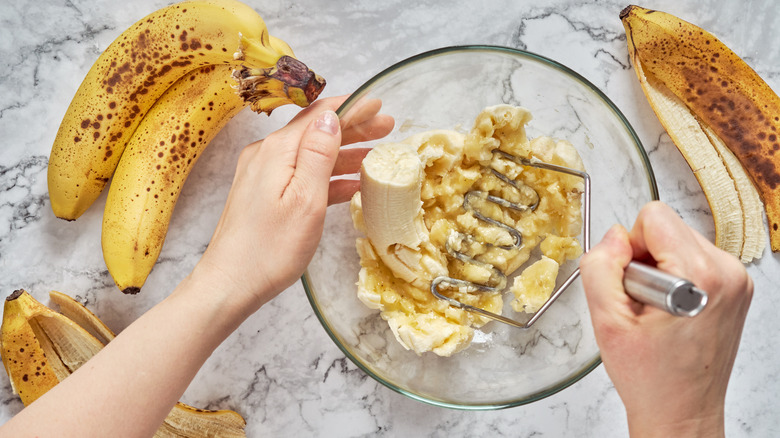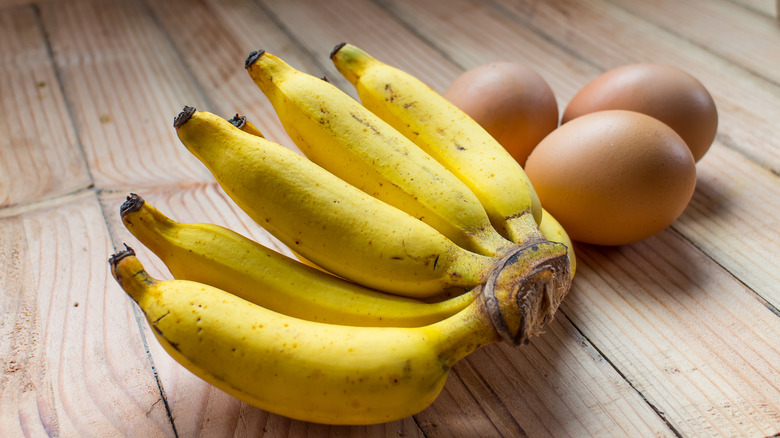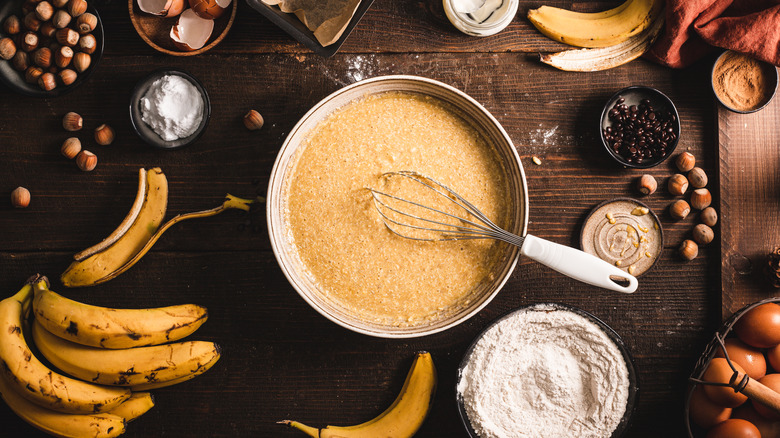Substitute Mashed Bananas For Eggs In Your Next Cake
The banana is a staple fruit that can be enjoyed in countless ways. Add one to a smoothie for a quick, healthy breakfast. Need to whip up a dish for a potluck? Slice up a few bananas for a tropical fruit salad. But did you know that you can use bananas in baking? No, we're not talking about banana bread, even though it's the perfect treat to accompany your morning coffee. It turns out that bananas are an easy egg substitute in certain recipes, including (but not limited to) cake.
While bakers who avoid using animal products are likely already aware of this swap as it's commonly used for making vegan pancakes and muffins, most probably aren't. Whether you're surprised or simply curious about the science behind this method, replacing eggs with mashed bananas as a binder is surprisingly effective in baking. The fruit can help you achieve a creamy texture and hold ingredients together — at a price much cheaper than eggs. So here's what you need to know to masterfully execute (and understand) this substitution, including which baked goods to try it with — and which ones you shouldn't add bananas to.
How and when you should — and shouldn't — swap eggs for bananas
When replacing eggs with bananas in a recipe, the ratio is simple: One banana for one egg. Of course, not all bananas (or eggs) are the same size and baking requires exact measurements for consistent results. For a precise substitution, use ¼ cup of mashed banana for 1 egg. When it comes to ripeness, choose fully ripe bananas. Not only will they mash easier, but they will be sweeter. Be careful not to use overripe bananas (a common banana bread-baking mistake) that smell funny or are beginning to liquefy, as they may leave an undesirable flavor.
Bananas are a great swap for eggs in standardly sweet baked goods. Since the fruit has a distinct flavor, it's best in recipes that it won't overpower. Additionally, bananas pack a lot of sugar — namely fructose — to offer a sweet taste and color. Generally, they work best as binders in cakes, pancakes, muffins, brownies, and other similar desserts or sweet breakfast foods.
But there are recipes you won't want to add bananas to as an egg substitute. For instance, this swap won't work well in a quiche. You would end up with a banana-based tart, which wouldn't pair well with the cheese or vegetables that usually go in a quiche recipe. Not only that, but bananas don't offer the same fat or protein as eggs for recipes — like quiche — that need those nutrients. Nor does the fruit help much with leavening compared to eggs, so it isn't ideal in custards or meringues.
The science behind banana as binder
So how does mashed banana work as a binder anyway? The answer comes down to a few key elements: Moisture, fiber, and sugar. Mashed bananas are goopy enough to resemble baby food — not an appetizing characteristic, but an excellent one for mouthwateringly moist treats. While you've probably never eaten a banana and thought, "Wow, how moist," the fruit clearly is. Bananas are 75% water, while a whole, raw egg is 76% water. The two are surprisingly similar in adding moisture to batters, helping to bind the ingredients together.
Bananas are also a good source of fiber, including pectin. Found in fruits, this carbohydrate is an important building block in the structure of cell walls. As it's well-equipped to help with binding at a molecular level, pectin is sometimes used in cooking and baking as a thickener, similar to gelatin. The sugars in a banana are also key to its role as a binder. Sugars bond with water, limiting how much moisture is available to starches and proteins and decreasing gluten development. This impacts the texture of your baked goods, making them soft and moist.
With all these molecular processes at play, it's no longer surprising how mashed bananas can rival eggs in achieving an optimal texture in cakes, muffins, and similar baked goods. While this won't be a perfect swap for all recipes, it's a great option for many — especially if you want to make something vegan.


